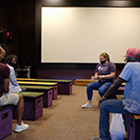Bring together biology, statistics and computer science, along with mastering the skills required to ask meaningful questions, and you will find yourself in the vast world of bioinformatics. That’s the world 28 KCU students find themselves in as of January 2020.
Those students are the first to take a new course in the exploding field of bioinformatics offered by KCU’s College of Biosciences (COB). By May 2020, those students will have completed an interactive introduction to bioinformatics and experienced the process of mining information databases to support clinical decisions.
Bioinformatics is an interdisciplinary field that develops methods and software tools for understanding biological data. It leverages the power of big data within the realm of medical data management to improve medical decision-making and ultimately improve health outcomes.
The field of bioinformatics relies on asking questions: How do you collect and acquire the data? How do you store and manage it? How do you work with the data? And ultimately, how do you transform the vast volume of discrete bits and bytes into useable information that will help drive clinical practice to improve patient well-being?
Bioinformatics requires a new type of expertise, and KCU’s course is in step with the University’s commitment to innovative health sciences education. Douglas Bittel, PhD, an associate professor in the COB and an active collaborator in genomics with physicians in the Heart Center at Children’s Mercy Kansas City, designed the lecture and interactive course syllabus.
The course emphasizes “-omics,” including genomics, transcriptomics and proteomics, the human genome and disease processes. “- Omics” refers to technologies that measure some characteristic of a large family of cellular molecules, such as genes, proteins or small metabolites. These collective technologies are used to explore the roles, relationships and actions of the various types of molecules that make up the cells of an organism.
Dr. Bittel and COB dean Robert White, PhD, are quick to point out that the hybrid course is not intended to turn students into statisticians or computer programmers. Rather, the objective is to familiarize students with a variety of bioinformatic tools that will have practical value for research in biomedical applications.
For example, hospitals and biotech companies need professionals who understand the science and research end of medical informatics. They must also have people trained to code and manage the data. On the clinical side, every hospital needs data to measure quality and patient outcomes. They need people or teams who can perform quality assessments and outcomes research that includes tabulating the data in a user-friendly format in order to track all aspects of performance and develop data that ultimately improves patients’ well-being. And, clinical physicians need to understand the underlying biology for their patients who undergo genetic testing and be able to explain the results to their patients, providing perspective and guidance.
The semester-long course consists of three, one-hour lectures every week with Dr. Bittel, and it includes special topics, such as incorporating informatics for decision-making at the bedside. Other special topics and speakers include an engineer from Garmin, who will discuss new electronic devices that patients can wear to collect information, and specialists from Children’s Mercy, who will describe their existing work in the pediatric cardiology department.
In addition to lectures, students conduct simulations to learn how to access existing databases, such as those maintained by the National Institutes of Health, and they will complete a project to practice working with data.
“There is a treasure of information in data, but you must determine how to frame the questions and analyze data in a way that delivers meaningful information,” Dr. Bittel explained.
The course sets the stage to help recruit students to KCU’s one- and two-year biomedical sciences tracks, eventually providing evidence to work with the Higher Learning Commission to establish an accredited master’s degree program in bioinformatics. Further down the road, bioinformatics training could be introduced into KCU’s medical school curriculum, with the possibility of offering a DO/MS dual-degree option.
KCU’s venture into bioinformatics will be showcased next April when the University hosts the Midwest Bioinformatics Conference on the Kansas City campus. The conference brings together bioinformatics-minded researchers from academia and industry to discover capabilities, share tactical approaches to problem solving, explore synergies and launch potential collaborations. Learn more at http://kcbioinformatics.org.



_20231212142823_0.png?w=140&h=140)
(0) Comments